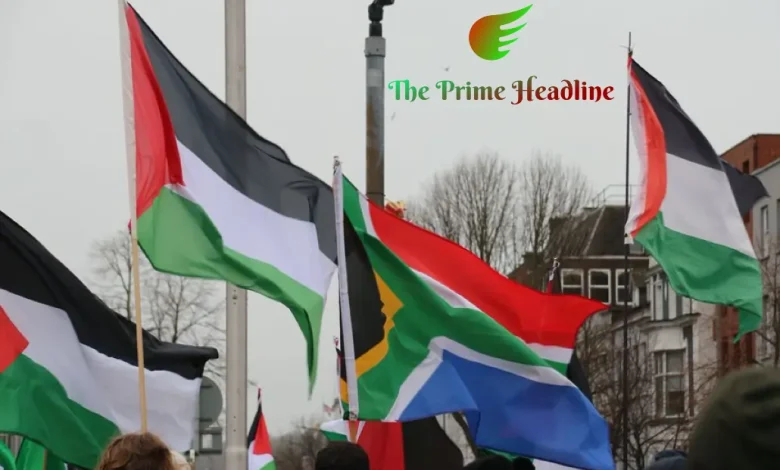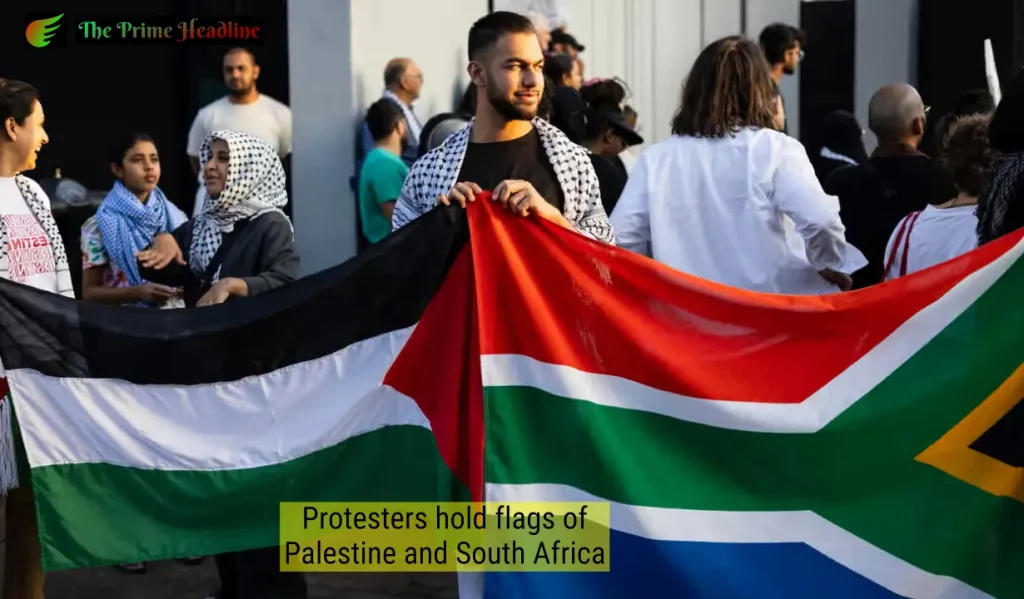
Read Latest Update: Arrest Warrants Issued by the ICC for Israeli Leaders: Benjamin Netanyahu and Yoav Gallant.
- South Africa has launched a case at the International Court of Justice (ICJ) accusing Israel of genocide against Palestinians in Gaza and asking the court to order Israel to halt its attacks. The filing and Israel’s decision to defend itself at the ICJ sets up a high-stakes legal battle before a bench of judges in the Great Hall of Justice. Here are some further details on the case and its ramifications:
- South Africa’s 84-page filing argues that Israel’s actions in Gaza “are genocidal in character because they are intended to bring about the destruction of a substantial part” of the Palestinians.
- The filing asks the ICJ for a series of legally binding rulings, including a declaration that Israel has breached its obligations under the Genocide Convention, an order for Israel to cease hostilities in Gaza that could amount to breaches of the convention, and reparations for the destruction caused in Gaza.
- The filing argues that genocidal acts include killing Palestinians, causing serious mental and bodily harm, and deliberately inflicting conditions meant to bring about their physical destruction as a group. It also says statements by Israeli officials express genocidal intent.
- The convention’s ninth article says disputes between nations over the convention can be submitted to the ICJ. Many South Africans, including President Cyril Ramaphosa, have compared Israel’s policies regarding Palestinians in Gaza and the West Bank with South Africa’s past apartheid regime of racial segregation. Israel rejects such allegations.
- Israel’s government swiftly rejected the genocide claim, calling it a “despicable and contemptuous exploitation” of the court. However, it confirmed that it would send a legal team to the Hague to defend itself against the allegations.
- South Africa’s filing includes a request for the court to urgently issue legally binding interim orders for Israel to “immediately suspend its military operations in and against Gaza.”
- The court will soon schedule public hearings, and lawyers for South Africa and Israel can make arguments. Judges drawn from around the world will likely take days or weeks to issue a decision on preliminary measures.
- The court will then enter a lengthy process of considering the full case. Israel could challenge the jurisdiction and seek to have the case thrown out before lawyers start arguing. Other countries that have signed the genocide convention could also apply to make submissions.
- Two other genocide cases are on the busy court’s docket. The case filed by Ukraine shortly after Russia’s invasion accuses Moscow of launching the military operation based on trumped-up claims of genocide and accuses Russia of planning acts of genocide in Ukraine. Another ongoing case involves Gambia, acting on behalf of Muslim nations, accusing Myanmar of genocide against the Rohingya Muslim minority.
- Learn about: Israel Launches Deadly Airstrikes on Lebanon Amid Escalating Conflict with Hezbollah and Recent Escalation Between Israel and Iran.
- The ICJ adjudicates cases between nations, while the International Criminal Court (ICC) seeks to hold individuals criminally responsible for genocide, war crimes, and crimes against humanity. The ICC has an ongoing investigation into the Israel-Palestinian conflict, dating back to the last war in Gaza. So far, it has not issued any arrest warrants. ICC prosecutor Karim Khan said last month that an investigation into possible crimes by Hamas militants and Israeli forces “is a priority for my office.”
- The ICJ and ICC are based in The Hague, Netherlands. The ICJ held its first sitting in 1946 as the world emerged from the carnage of World War II. The ICC started work in 2002 with the lofty goal of ending global impunity for atrocities.

- Two now-defunct U.N. tribunals also held landmark genocide trials. The International Criminal Tribunal for the former Yugoslavia convicted a series of high-ranking Bosnian Serbs, including former President Radovan Karadzic and his military chief Gen. Ratko Mladic, for their roles in the July 1995 massacre of more than 8,000 men and boys in the Bosnian town of Srebrenica. Both Karadzic and Mladic were given life sentences.
- The International Criminal Tribunal for Rwanda convicted a string of leaders involved in the African nation’s 1994 genocide when some 800,000 people, mainly ethnic Tutsis, were slaughtered.
- South Africa’s Jewish Board of Deputies and the chief rabbi, Warren Goldstein, have criticized the government’s decision to take Israel to the ICJ, accusing it of continuing “to humiliate itself in the international arena” and of using international courts for political purposes.
- However, some Jewish South Africans, including a former ANC member of parliament, Andrew Feinstein, have defended the government’s decision, saying that the Board of Deputies has never criticized anything Israel has done and that it lacks moral integrity. Feinstein also noted that the Board of Deputies collaborated with the white regime during apartheid and chose to honor figures such as Percy Yutar, the prosecutor who sent Nelson Mandela to prison.
- The South African government has maintained that its decision to take Israel to the ICJ is based on its support for the Palestinian people and its belief that Israel is violating international law in its treatment of Palestinians in Gaza.
- Jordan’s foreign minister, Ayman Safadi, said that his country would support South Africa’s case at the ICJ and would prepare the necessary legal documents in consultation with legal experts. Safadi also said that there are 43 Arab and Islamic countries that are members of the 1948 Convention on the Prevention and Punishment of Genocide, and that one of the decisions of the joint Arab-Islamic summit was to assign the general secretariats of the Arab League and the OIC to prepare legal files. Safadi added that Jordan was among the first countries to call on the United Nations to hold Israel and Israeli officials accountable for war crimes committed in Gaza.
- Malaysia has also said that it is backing South Africa’s case at the ICJ, calling it a “timely, tangible step towards legal accountability”, while reiterating calls for Israel to “immediately end its atrocities” in Gaza.
- Israel has picked Aharon Barak, a former president of the Israeli Supreme Court, to represent it at the ICJ. Barak is known for his liberal views and his rulings on human rights and democracy.
- The ICJ case is expected to take years to resolve, and it is unclear what impact it will have on the situation in Gaza. However, it is likely to further strain relations between Israel and South Africa, as well as other countries that support the Palestinian cause.
FAQs:
What action has South Africa taken against Israel?
South Africa has filed a case against Israel at the International Court of Justice (ICJ), accusing it of genocide in Gaza.
What is the basis of South Africa’s lawsuit?
South Africa alleges that Israel’s actions in Gaza violate the UN Genocide Convention, citing the high number of Palestinian casualties and destruction in Gaza.
When was the case filed?
The case was filed on Friday, December 29, 2023.
What is Israel’s response to the lawsuit?
Israel has strongly rejected the allegations, calling them “blood libel” and stating that they have no legal merit.
What specific actions does South Africa want the ICJ to take?
South Africa has requested the ICJ to order Israel to cease military operations in Gaza and to allow humanitarian assistance for Palestinians.
Why has South Africa taken this action?
South Africa views Israel’s actions in Gaza as a violation of international law and human rights, drawing parallels to its own history of apartheid.
What is the significance of this case?
This case represents a major legal challenge to Israel’s military campaign in Gaza and could potentially influence international opinion and policy regarding the conflict.
Related Resources:
- https://www.newarab.com/news/who-representing-israel-s-africa-gaza-genocide-case
- https://www.theguardian.com/world/2024/jan/08/south-africa-genocide-case-israel-apartheid-history
- https://apnews.com/article/un-court-south-africa-israel-gaza-genocide-71be2ce7f09bfee05a7cae26689ee262
- https://www.newarab.com/news/jordan-backs-south-africa-icj-genocide-file-against-israel






